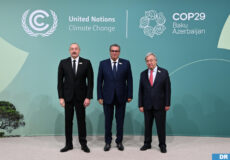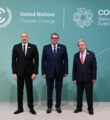Science, Solidarity and Solutions Needed Against Climate Change: UN Chief
New York (United Nations) – Concentrations of greenhouse gases in the Earth’s atmosphere are at record levels, and emissions that saw a temporary decline due to the pandemic are heading towards pre-COVID levels, while global temperatures continue to hit new highs, according to a major new UN report.
“United in Science 2020”, released on Wednesday, highlights the increasing and irreversible impacts of climate change on glaciers, oceans, nature, economies and it’s cost on people across the globe; manifest more and more often through disasters such as record heatwaves, wildfires, droughts and floods.
Speaking at the launch of the report, UN Secretary-General António Guterres emphasized that there is “no time to delay” if the world is to slow the trend of the devastating impacts of climate change, and limit temperate rise to 1.5 degree-Celsius.
“Whether we are tackling a pandemic or the climate crisis, it is clear that we need science, solidarity and decisive solutions,” said Guterres.
“We have a choice: business as usual, leading to further calamity; or we can use the recovery from COVID-19 to provide a real opportunity to put the world on a sustainable path,” he added.
The Secretary-General outlined six climate-related actions to shape the recovery from COVD-19, to ensure a sustainable future for coming generations.
The six actions include: delivering new jobs and businesses through a clean, green transition; making public bailouts contingent upon green jobs and sustainable growth; shifting away from grey and towards green economy, making societies and people more resilient; channelling public fund investments into sustainable sectors and projects that help the environment and the climate; factoring in climate risks and opportunities into the financial system as well as in public policymaking and infrastructure; and lastly – working together as an international community.
On the state of the global climate, the report indicates that the average global temperature for 2016-2020 is expected to be the warmest on record, about 1.1 degree Celsius above 1850-1900 (a reference period for temperature change since pre-industrial times) and 0.24 degree Celsius warmer than the global average temperature for 2011-2015.
The report brings together the latest climate science related updates from a group of key global partner organizations. It presents the very latest scientific data and findings related to climate change to inform global policy and action.














